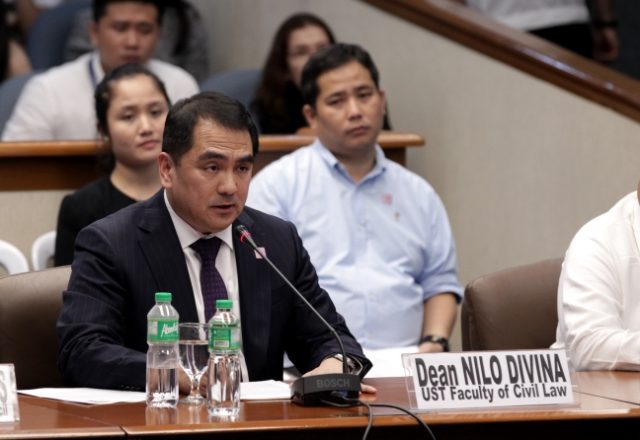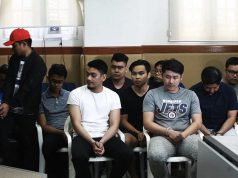MANILA, Philippines — The Senate Committee on Public Order and Dangerous Drugs has recommended the disbarment of University of Santo Tomas (UST) Faculty of Civil Law dean lawyer Nilo Divina and other members of the Aegis Juris fraternity over the hazing death of UST law freshman Horacio “Atio” Castillo III September 17 last year.
In a 33-page Committee report 232 released Tuesday (January 23), the panel recommended the disbarment of Divina and at least 18 lawyers and others who may have knowledge on Atio’s death but failed to report the incident to authorities.
The lawyers include: Marvi Abo, Alston Kevin Anarna, Edzel Bert Canlas. Cecilio Jimeno, Ferdinand Rogelio, Eric Fuentes, Cesar Ocampo Ona, Gaile Dante Acuzar Caraan, Henry Pablo, Jr. , Jet Dela Pena Villroman, Cesar Dela Fuente, Nino Kjell Servanez, Manuel Angelo Ventura III, Michael Vito, Arthur Capili, Irvin Joseph Favella, Edwin Uy, and Allan Christopher Agati.
“With all due respect to the power of the Supreme Court to discipline members of the Philippine Bar, this Committee recommends the immediate institution of proper disciplinary or disbarment proceedings,” the Committee report said.
The Committee also requested that the issue be given preference and be dealt with as soon as possible considering that another life was lost because of “barbaric” fraternity practices.
“The actions taken by these members constitute grossly immoral conduct that is shocking, against the decency expected from lawyers and a mockery of the legal profession,” the report said.
“In order to set an example, so as to deter further incidents of hazing, it is paramount that these individuals be dealt with, and possibly deprived of the privilege to practice law, urgently,” it added.
‘Divina favored the frat’
Senator Panfilo Lacson, Committee chair, in his sponsorship speech, rejected Divina’s claim that he had no means of identifying the neophyte who died while being initiated by his own fraternity noting that there were several people he could reach out to including his law partner lawyer Edwin Uy who at that time already had knowledge of Atio’s death.
“Hindi naman po yata katanggap-tanggap na ang isang personalidad (It’s unacceptable that a personality) as ‘influential’ as Dean Divina would allow himself to be clueless, considering that the issue would have disastrous effect not only on his leadership, but also on his reputation,” Lacson said in his speech.
The Committee report said that apart from his discretionary acts that showed bias in favor of the fraternity, there were photos that reveal his active participation in fraternity-related activities.
It also pointed out that as long as Divina remains in office, possible student witnesses may opt to remain silent out of “fear of jeopardizing their grades and ultimately their chances of graduating.”
The report urged him to “humbly step down” as dean and let investigation take its own course as it is “the least he can do to make up for the injustice done to the Castillo family.”
Moreover, it questioned how Divina’s law firm Divina Law is counsel of UST, as it failed to serve the best interest of the university when its very own managing partner passes the blame to it to save face.
“It seems that Dean Divina has a habit of passing the buck to other officials or offices in the university. Not once did we hear him take responsibility for any lapses that may have contributed to Castillo’s death,” the report said.
DOJ urged to file charges
The Committee also urged the Department of Justice (DOJ) to further investigate the attempted cover-up the the resident and alumni members of the fraternity.
Moreover, it should request Facebook Philippines to provide an authenticated copy of the profiles and the group chat of members presented during public hearings.
Senator Juan Miguel Zubiri, who called for the probe into Atio’s death, urged the Department of Justice (DOJ) to file charges against those involved in the killing.
“I urge Justice Secretary Aguirre to file the charges against the perpetrators in the killing of University of Santo Tomas student Atio Castillo,” Zubiri said in his speech.
Zubiri said that during hearings on the case, he raised several issues such as the unwarranted secrecy, use of relentless mental and physical torture, neglect by UST authorities and intent to cover up their criminal acts.
He, meanwhile, expressed confidence that the Senate recommendations and amendments to the Anti-Hazing Law will prevent senseless injuries, mental and emotional distress and deaths from hazing.
“The illegal acts constituting hazing are now explicitly stated without room for grey areas; unlike the old law which accepted and merely regulated fatal hazing rites,” Zubiri said. “We may now hope that the Castillo family will feel that wheels of justice will move in their favor.”
Expanded coverage, harsher penalties
The Committee report, meanwhile, recommended ton expand the definition of hazing to include “physical or psychological suffering, harm or injury inflicted on a recruit, member, neophyte, or applicant as a form of initiation rite or practice made as a prerequisite for admission or a requirement for continuing membership in a fraternity, sorority or organization.”
It covers actions ranging from paddling to forced calisthenics, exposure to the weather, forced consumption of food, drinks or drugs, and “any other brutal treatment or forced physical activity which is likely to adversely affect the physical and psychological health of such recruit, member, neophyte or applicant.”
Also, it prohibits “all forms of hazing” in fraternities, sororities or organizations in schools, communities and even businesses and uniformed service learning institutions.
Harsher penalties of up to reclusion perpetua or 40 years’ jail time and PHP3 million in fines are among the measures being eyed to prevent a repeat of deaths due to hazing.
Schools can also impose disciplinary sanctions up to expulsion to the head and officers of fraternities involved in hazing. Meanwhile, members of the fraternity, sorority or organization who participated in unauthorized initiation rites, even if no hazing was conducted, can also be punished.
Persons who had knowledge of any hazing acts committed but failed to report it to the authorities or those to be found guilty of hiding, concealing or hampering or obstructing investigation should be penalized.
It meanwhile, urged schools to be “more active and proactive” in regulating school-based initiation rites.










